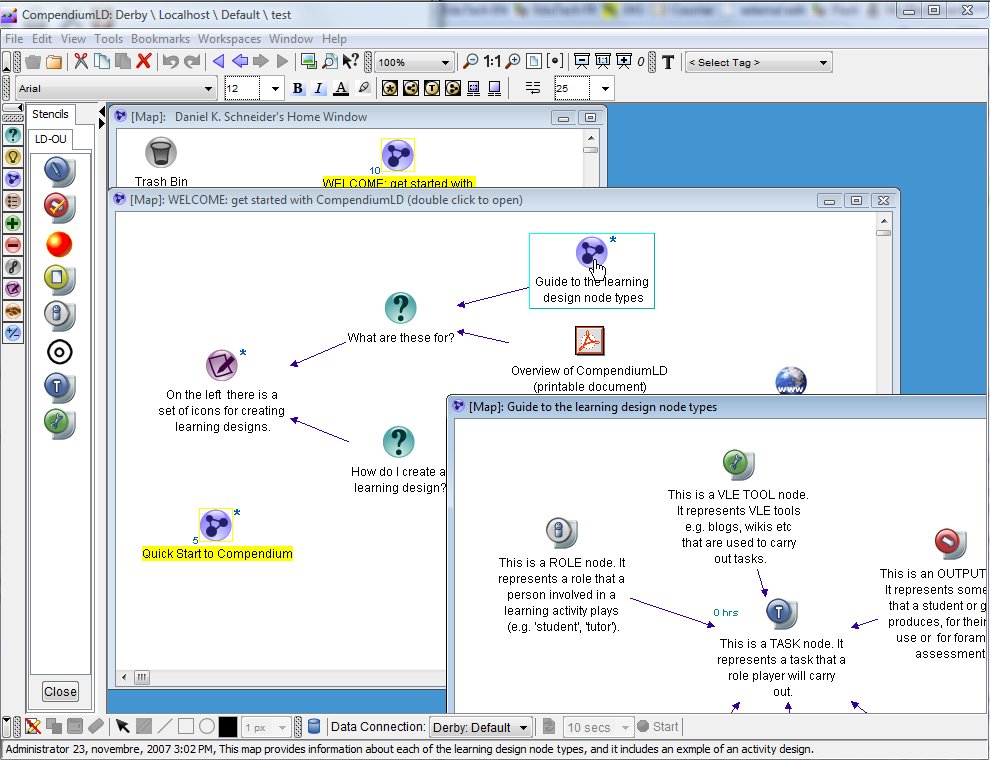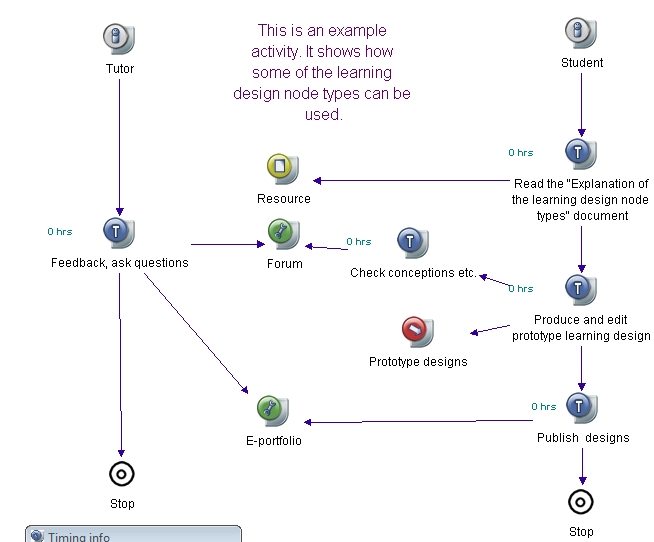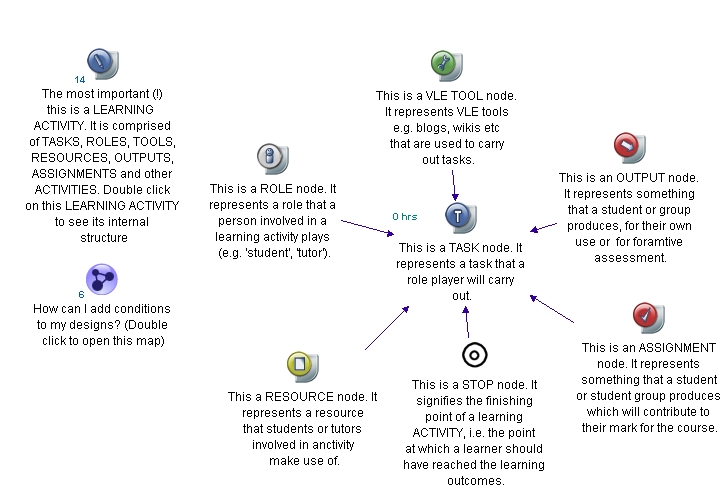Compendium LD
Definition
Compendium LD or CompendiumLD is a learning design editor. It has been implemented on top of the Compendium mind mapping and argumentation software and can be used as a design tool.
Compendium LD is a rather high level design tool. It will not generate executable code like MOTPlus or the ReCourse editor, but it is much easier to use. However, since concepts maps can be exported as HTML pages with a menu, it might be possible to create a web site for an activity in the spirit of learning design, however the result would need some hand editing (but we have not tested this yet).
Context
Compendium LD is part of an overall Open University Learning Design Initiative. Its “aim is to develop and implement a methodology for learning design composed of tools, practice and other innovation that both builds upon, and contributes to, existing academic and practioner research.” and the project stakeholders “are interested in providing support for the entire design process; from gathering initial ideas, through consolidating, producing and using designs, to sharing, reuse and community engagement.” ([1], retrieved 12:51, 28 January 2009 (UTC).) The overall project includes three strands of work:
- The Compendium LD editor
- Cloudworks
- Empirical research and evidence gathering
The development of Open University's learning design methodology and associated tools is based on internal empirical research (e.g. extensive case studies, interviews, evaluation worksshops etc. with course leaders) and the wider litterautre. This transformative design research project consists of four interconnect facets: “understanding design - through gathering empirical evidence about design visualising design - as a means of articulation and representation guiding design - through appropriate scaffolds and support and sharing design - to inspire and encourage uptake and reuse.” (Empirical research and evidence gathering, retrieved 13:50, 29 January 2009 (UTC)). Compendium LD is related to issues two and three. Issue four is covered by cloudworks.
Members of this project are Simon Cross, Andrew Brasher, Grainne Conole (project leader), Juliette White, Paul Clark, Martin Weller and Perry Williams.
Overview
The editor let's you edit several maps and that are part of a project. Every modification is directly written to a database and doesn't need saving.

A the heart of the OU Learning Design extensions is the learning activity (i.e. the pedagogical scenario). Below is a screenshot from the built-in introduction:

Open university defined eight learning design nodes. In principle, you only need these to create a design.

Exporting
Compendium LD is a design tool that does not produce executable code (unless you plan to have your students use compendium or simple web pages).
Import options:
- Most electronic formats (pictures, PDFs, PPT, etc.) can be imported by drag and drop, e.g., from the file manager
- Compendium LD backups and compendium LD XML files (?)
- Instead of importing, one also can make links to URLs using the reference nodes
Export options:
- XML file
- Web outline
- Web maps (a hierarchical website with a menu for navigation and map pictures)
- Power export (zip file with all of the above)
- Jpeg File
- Backup with various options
Documentation
Documentation for the tool is provided within:
- A first time user finds a Compendium map that explains Compendium LD itself
- In the Help menu: Help contents open a window with the reference manual
- In the Help menu: There is a "Camtasia Studio" type of movie that explains how to get started.
- In the Help menu: A short getting started PDF, the Compendium LD 2-page short guide
The software
Copendium LD is free. You only need to fill in a form and provide an email address.
CompendiumLD is a specialised version of Compendium, a mind mapping or argumentation software. All the facilities provided by Compendium are included within CompendiumLD, but a typical Compendium Learning Design user should not use the typical standard nodes.
In addition to mapping, this software also can be used to “manage your personal digital information resources, since you can drag+drop in any document, website, email, image, etc, organise them visually, and then connect ideas, arguments and decisions to these. Compendium thus becomes the 'glue' that allows you to pool and make sense of disparate material that would otherwise remain fragmented in different software applications. You can assign your own keyword 'tags' to these elements (icons), create your own palettes of icons that have special meanings, overlay maps on top of background images, and place/edit a given icon in many different places at once: things don't always fit neatly into just one box in real life.” (About Compendium. Since the "LD" version includes all these features, that means that you can design learning designs that include documents and links.
The System requirements for Compendium LD v.06 are:
- Windows XP (SP2). It also runs under Vista Professional - 13:50, 29 January 2009 (UTC)~.
- Java Runtime Environment v1.6+ (a version is also in the installer)
- A Pentium III with 256M RAM.
Download
- download link (decomissioned
- GitHub. As of March 2019, the download link is not visible, but you can find it under releases. The Win version is the same as one I found on my PC - Daniel K. Schneider (talk) 12:35, 25 March 2019 (CET)
Links
- OU Learning Design Initiative (Dead link)
- Compendium LD: Learning design software (Dead link)
- Using CompendiumLD to design a learning activity Slides by Paul Clark, OU. (locked)
- List of team blogs (Dead link)
Bibliography
- Brasher, Andrew, Conole, Gráinne, Cross, Simon, Weller, Martin, Clark, Paul and White, Juliette (2008). CompendiumLD – a tool for effective, efficient and creative learning design. In: Proceedings of the 2008 European LAMS Conference: Practical Benefits of Learning Design, 25-27 June 2008, Cadiz, Spain. Abstract - PDF
- Conole, G., Brasher, A., Cross, S., Weller, M & Nixon, S., (2008) 'Visualising learning design methodology to foster and support creativity in design', Journal of Educational Media International, 45 (3), [DOI: 10.1080/09523980802284168]
- Conole, Grainne; Brasher, Andrew; Cross, Simon; Weller, Martin; Nixon, Stewart; Clark, Paul and Petit, John(2008). A new methodology for learning design. In: Proceedings of World Conference on Educational Multimedia,Hypermedia and Telecommunications (EDMEDIA), 30 Jun - 4 Jul 2008, Vienna. Available at: http://oro.open.ac.uk/15269/ [Accessed May 3, 2019].
- Conole, G., 2008. New Schemas for mapping pedagogies and technologies. Ariadne magazine, (56). Available at: http://www.ariadne.ac.uk/issue56/conole/ [Accessed November 24, 2009].
- Conole, Grainne (2010). A holistic approach to designing for learning: A vision for the future. In: Annual International CODE Symposium, 18 February 2010, Chiba, Japan. Available from: https://www.researchgate.net/publication/44207235_A_holistic_approach_to_designing_for_learning_A_vision_for_the_future [accessed May 18 2019].